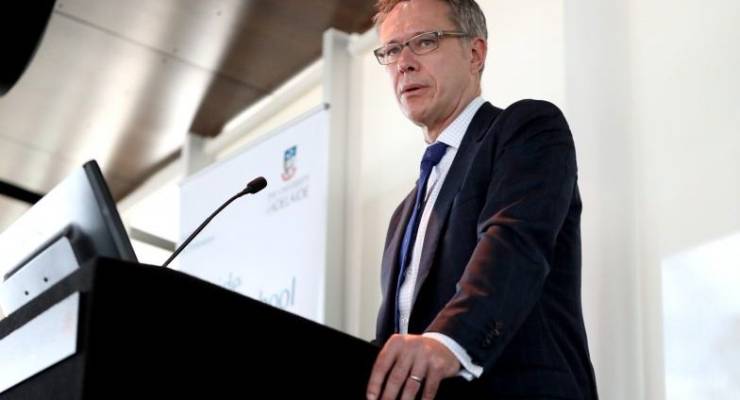
Did you hear the news? The Reserve Bank has “indicated the recession is over“, according to News Corp. Kerry Stokes’ The West Australian confirms that — “Recession over, says Reserve Bank” — and Stokes’ Seven News repeated the claim, as did Sky News.
With so many media outlets saying it, surely it must be true? Well you won’t believe this, but just because the government’s main news media propagandists say something is true doesn’t mean it is.
RBA deputy governor Guy Debelle in fact told Senate estimates yesterday that its best guess was that the September quarter GDP result would be “positive growth rather than slightly negative”.
A small positive result won’t make up for the large-scale collapse in the economy in the June quarter and won’t make a jot of difference to the growing number of jobless. But the reason why the RBA thinks that we’ll fall into positive territory in July, August and September is more interesting.
“As best as we can tell, the growth elsewhere in the country was more than the drag from Victoria,” Debelle said, “and possibly the drag from Victoria was a little less than what we guessed back in August.”
That doesn’t fit at all with the narrative run by the government and its media friends that Premier Daniel Andrews was going to destroy the national economy with his Melbourne lockdown. His “lockdown will punch a massive hole in Australia’s economy”, claimed Liberal Party-controlled Nine back in August.
The Australian’s Dennis Shanahan — who has still never explained or apologised for his absurd claim that Victoria would suffer weeks of case numbers exceeding 1000 a day — told Sky News that Australia “will have to carry the cost of Victoria for years to come”. (No mention of the tens of millions of borrowed money the government gifted to News Corp, the cost of which taxpayers will also carry for years to come.)
Echoing Cold War rhetoric, Prime Minister Scott Morrison declared Andrews’ lockdown would have a “domino effect” throughout the national economy, with “severe impacts”.
Will all those claims be retracted when it turns out the lockdown didn’t have the dramatic impact the government claimed?
The search for an easy headline — “Australia in recession!”, “Recession over!” — also obscures that the pandemic is dramatically changing the economy.
Take retail, which has undergone a remarkable shift online. The Australian Bureau of Statistics said the proportion of monthly sales held by online retailers rose to 11% in August, up from 6.4% in August last year.
Retailers such as Adairs, Temple & Webster, Kogan, Nick Scali, The Reject Shop, Premier Investments, Bapcor, Super Retail Group, Coles and Woolies, Metcash, Bunnings and even Myer have reported stronger than expected online sales growth this year.
In fact when Andrews announced the relaxation of the lockdown this week the share prices of those retailers that have done well (Temple & Webster, Adairs, Kogan, JB Hi-Fi) fell sharply.
The pandemic purged the long-held fear of Amazon arriving in Australia and destroying local incumbents, because Amazon is now just another of many online retailer here. Even Woolworths saw a surge in online grocery and food sales in 2019-20, selling $3.4 billion.
That rapidity of the shift online has helped soften the impact of lockdown in ways few would have expected and which seems beyond the grasp of media outlets looking for a simple story.
We won’t find out about the recession until December when the ABS releases the September quarter national accounts. But it will be a significantly different economy by then.









The benchmark of exemplary performance, whether in the health or economic domain, continues to be prosecuted by the federal govt and associated media supporters as the salient measure of failure and culpability of the Victorian Govt. and the Premier. While the citizens of Victoria have consistently supported the Premier to succeed, his political and media opponents have behaved unconscionably by wishing him to fail despite the inevitable cost to the health and economic interests of all Victorians if this transpired. The LNP and its media friends have placed political opportunism above the interests of Victorians citizens and this should never be forgotten or forgiven. We can “aim high when they go low” and work each day to excise this putrescence from the public discourse.
And one of those media opponents is right here on Crikey – Bernard Keane. (I tried to post a link, but it was broken.)
They’ll still blame Victoria.
“RBA Best Guesses”?
And since when did the whole truth matter to those parts of our media playing this up now?
Some questionable work in their assumptions. While most went into lockdown in late March, the lockdown wasn’t total anywhere and was basically being lifted in parts by late May and June. Come late July Vic goes into a serious lockdown while other states gradually come out of it.
It is lineball, but we may have overall had some growth over the Sept quarter, but that is in comparison with the June quarter which was harshly affected everywhere. At best it will be small growth against the 10% (?) drop in June. A statistician’s growth.
Why don’t they ask the million and rising numbers of the unemployed, if the recession is over.
The Morrison Government is the worst government since 74AD.
Elected with no plan and still hasn’t got a plan.
Just more spin from the man who can’t add up, Morrison.
Bloody hell, Bev, couldn’t you pick a date a bit more contemporary than 74AD? I don’t know what happened then but I guess the Romans were involved. I’m pretty sure there have been worse governments & more serious political outrages that caused more harm since then.